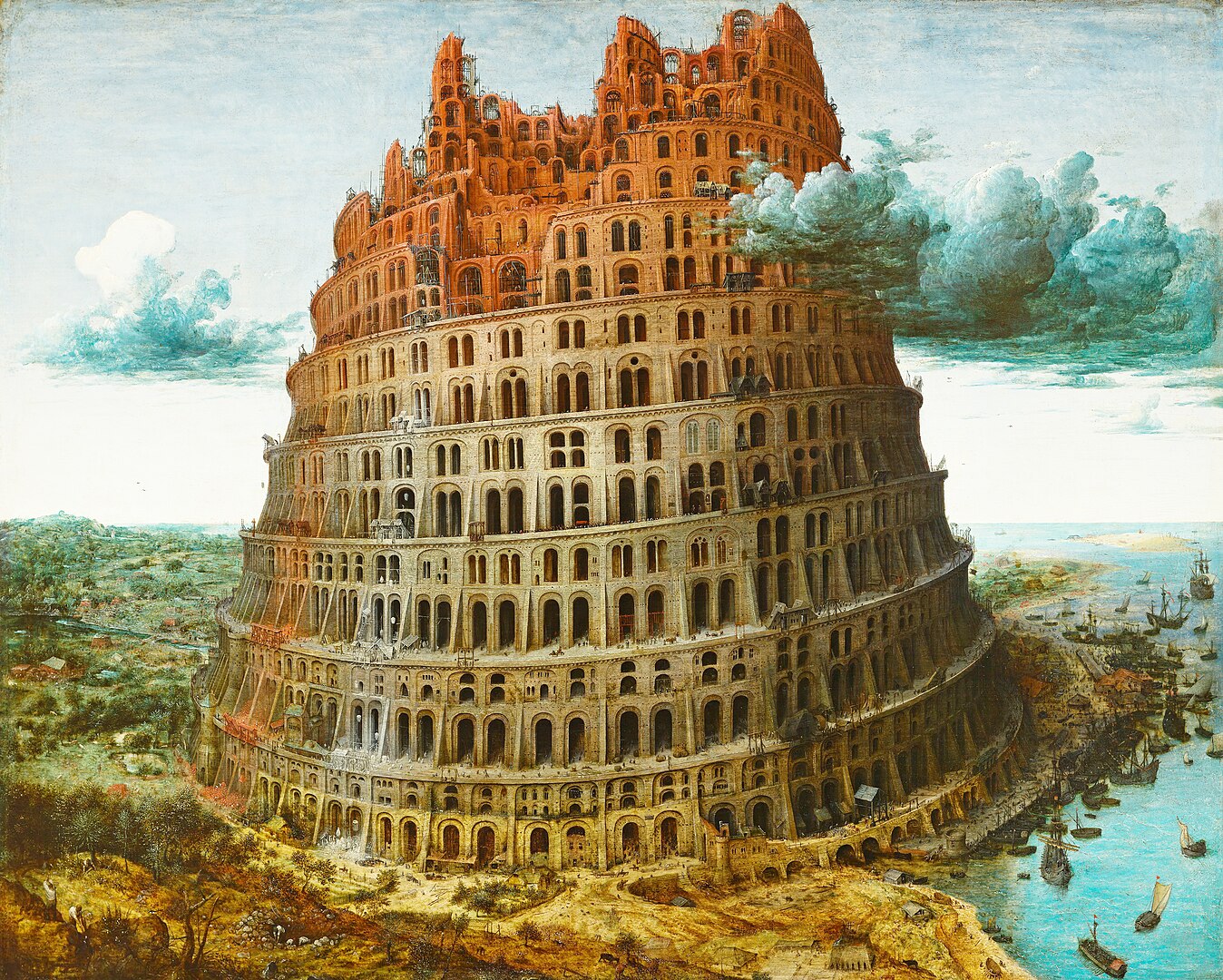Tower
 The Tower of Babel, Pieter Bruegel the Elder, 1563
The Tower of Babel, Pieter Bruegel the Elder, 1563
Just as the Arcology is a fantasy of a future social arrangement reified in the built environment—one that describes, through worldbuilding, who belongs inside and who remains outside—the Tower of Babel appears in culture-building myths as the origin of difference, as if such divisions were handed down by God. Genesis spends very little time with the confusion of tonuges, but it comes at the end of the Table of Nations—a biblical genealogy that patrilinially lists the names of Noah’s decendents (there is no mention of their mothers). The list of 70 names introduces ethnic names and biblical place names as names of individuals, describing much of the small picture of the world that the Hebrews would have had. As Christianity spread, many of the peoples subsumed by it would not have seen themselves in the Table of Nations, and instead would have to write themselves instead into the story of Babel.
Cum filii hominum in agro Sennar post diluvium non recolentes nec mente pertractantes sponsionem factam a Deo ad Noe, patrem eorum, dicentem: „Nequaquam perdam ultra aquis diluvii omnem carnem et ponam arcum meum in nubibus celi, et erit signum federis inter me et terram“, sed pocius diffisi de Deo pre timore iterum futuri diluvii civitatem et turrim in altitudinem maximam construere niterentur; omnipotens Deus insipienciam eorum redarguens et magnificenciam sue divine potestatis ostendens in eodem loco linguas eorum divisit in LXXII ydiomata. Et inde nominata est turris eadem Babel, quod interpretatur linguarum confusio. Ibi eciam unum ydioma slouanicum, quod corrupto vocabulo slauonicum dicitur, sumpsit inicium, de quo gentes eiusdem ydiomatis Slouani sunt vocati. In lingua enim eorum slowo verbum, slowa verba dicuntur, et sic a verbo vel verbis dicti ydiomatis vocati sunt Slouani.
When the sons of men, in the plain of Shinar after the flood, neither remembering nor considering in their hearts the covenant made by God with Noah their father—when He said: “Never again will I destroy all flesh with the waters of a flood, and I will set my bow in the clouds of heaven, and it shall be a sign of the covenant between me and the earth”—but rather, distrusting God out of fear of another flood to come, sought to build a city and a tower of the greatest height, Almighty God, reproving their folly and showing the greatness of His divine power, in that very place divided their tongues into seventy-two languages.
And from this the same tower was named Babel, which is interpreted “confusion of tongues.” There also one tongue, the Slavic tongue—called in corrupted speech “Slavonic”—took its beginning, from which the peoples of that tongue were called Slavs. For in their language slowo means “word,” slowa means “words,” and thus, from the word or words of that tongue, they were called Slavs.
— Pulkava’s Chronica Boemorum
Genealogy is a study of the transmission—not primarily of blood, which is fickle and runs in hidden aquifers—but of the transmission of culture, wealth, and of relations to land. In that cultural transmission first, overshadowing so much else, is the transmission of language— the thing God is imagined to have torn apart in the physical act of destroying architecture, in disaster. When there is a break in that transmission of language, there is a rupture.
The various ways that individual bodies connect, through couplings, parenting, families. Records of birth, death, war, employment, residence, inheritance. Language, ruins, land, forgetting, records, the bones of history stripped of the flesh of life.